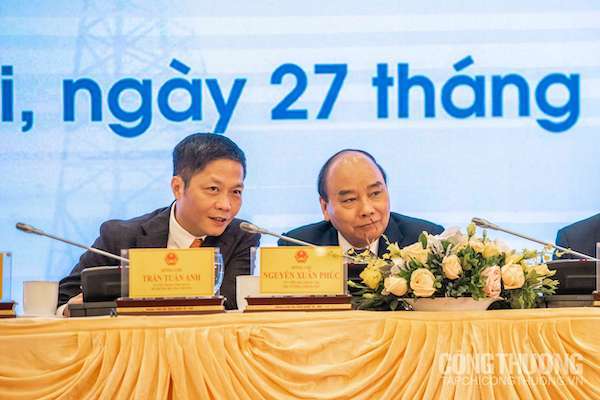 |
|
Prime Minister Nguyen Xuan Phuc and Minister of Industry and Trade Tran Tuan Anh at a conference to review the work of the industry and trade sector in 2020.
|
Mr. Nguyen Quoc Dung, Head of Business Department, Electricity Vietnam group (EVN) still remembers the bad feeling of a few years ago.
At that time, the electricity access index of Vietnam ranked 156 out of 170, the lowest in the world. “I was shocked and didn't understand why. We tried to do well but were underestimated by the world,” recalled Dung.
After doing research, he discovered that EVN had long been ignoring global standards. "We no longer compared ourselves with ourselves anymore but compared ourselves to the world to know who we are, where we are." That approach was supported by EVN's leaders and implemented for the whole system. As a result, the electricity access index reached 27/190 countries ranked by the World Bank.
The remarkable rise of EVN and some other areas was thanks to the Government's steadfast determination through Resolution 19, now Resolution 02, which put pressure on ministries, sectors and local governments.
It was a long process of awareness improvement. In 2009, American professor Michael Porter was invited to help Vietnam build international standards for business environment assessment.
However, a Government leader at that time did not agree when saying that Vietnam must build its own set of criteria. The director of the Central Institute for Economic Management, Nguyen Dinh Cung, who was assigned to draft the criteria, was completely stuck.
"Three or four years passed and we could not do anything about it," he recalled. Only when Deputy Prime Minister Vu Duc Dam received that task and asked to use international standards (because Vietnam did not have methodology and data) was the content of Resolution 19 drafted and approved.
Thanks to that resolution, Mr. Cung and his colleagues were supported by many people, especially Deputy Prime Minister Vu Duc Dam and Minister, Chairman of the National Assembly Office Mai Tien Dung.
Letter to Minister
With the support of Prime Minister Nguyen Xuan Phuc, they organized meetings on the implementation of Resolution 19 in ministries, agencies and localities on reducing the number of business conditions.
Industry and trade used to be the stronghold of many business conditions and the ask-give mechanism. In 2016, when Prime Minister Nguyen Xuan Phuc took office and expressed his high determination to reform institutions, an opportunity came.
Head of the Legal Department of the Vietnam Chamber of Commerce and Industry (VCCI) Dau Anh Tuan recalled: “In early 2016, when VCCI reported to the Government that the Ministry of Industry and Trade had the most business conditions, the ministry reacted harshly. But after that, things were different very quickly.”
“The business environment became more open due to the determination to reform institutions, along with a stable macro-economy. This created a fertile ground for businesses to develop with nearly 130,000 newly established firm each year, a record."
In June 2016, Mr. Nguyen Dinh Cung wrote a letter to the Minister of Industry and Trade Tran Tuan Anh about business barriers that need to be removed such as formaldehyde testing, energy labeling, rice export... However, he did not send the letter immediately but waited to see.
In the first working session of his term with the Ministry of Industry and Trade on July 12, 2016, Prime Minister Nguyen Xuan Phuc pointed directly that this ministry was "one of the few" ministries and agencies that were being complained about.
880 business investment conditions cut for industry and trade sector
Just over a month later, Minister Tran Tuan Anh organized a series of unprecedented internal meetings. He demanded to cut a lot of business conditions despite many objections.
Later, the abolition of Circular 37 on testing the content of formaldehyde on textile products saved thousands of billion VND, tens of thousands of working days for 6,000 textile enterprises, hundreds of leather and footwear businesses, and thousands of businesses importing related goods.
Over the past five years, Mr. Tran Tuan Anh requested to cut 880 business investment conditions. An official in the ministry said, the minister's actions are not always supported by subordinates because cutting business conditions is reducing their power and their profits.
When summarizing the work of the industry and trade sector in 2020, Prime Minister Nguyen Xuan Phuc asked the Ministry of Industry and Trade to focus on institutional improvement, reform of state management methods in the direction of changing management thinking from pre-check to post-check, and creating an open environment for development investment associated with improving efficiency in state management...
According to the Government Office, more than 50% of the total of about 6,000 business conditions have been reduced and simplified. The business environment became more open due to the determination to reform institutions, along with a stable macro-economy. This has created a fertile ground for businesses to develop with nearly 130,000 newly established firm each year. The Prime Minister clearly understood that when he issued resolution 68/2020 of the Government with the ambitious goal of cutting business regulations by a further 20%.
The battle against sublicensing, despite many achievements, must continue. All to ensure people's freedom of business.
Tu Hoang

Institutional reforms needed to support enterprises' development
Phan Duc Hieu, deputy director-general of the Central Institute for Economic Management under the Ministry of Planning and Investment, talks about young Vietnamese enterprises’ need for Government support.

Extensive reforms behind the border
When the Covid-19 pandemic, which started in Wuhan in China a year ago, broke out, even the most optimistic person could not imagine that the Vietnamese economy would stand firm.